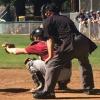NCAA Test Question - Coach spikes his hat
Umpire-Empire locks topics which have not been active in the last year. The thread you are viewing hasn't been active in 3359 days so you will not be able to post. We do recommend you starting a new topic to find out what's new in the world of umpiring.


Recommended Posts